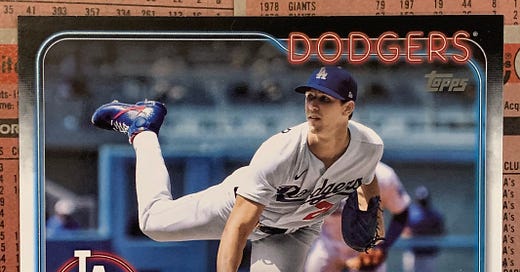“Intuition is the art of knowing without knowing why.”
There’s a house in the neighborhood that began displaying words of wisdom in March 2020. During daily walks with my kids, I would look forward to passing the whiteboard, mounted on a post where the front lawn meets the sidewalk. The message offered perspective and encouragement during an otherwise tumultuous time.
These days, I read the words of inspiration while on my evening walks with the Warning Track Puppy. I’m beginning to wonder if these neighbors might be baseball fans.
The day before the NLCS began, the sign read: Intuition is the art of knowing without knowing why.
While Big Data and analytics attempt to erase that message, I’ve been relieved and energized to see it every night so far this week.
It’s what once separated the good managers from the great ones. It’s what takes a scout back to a player for one more look. It’s the sense that is born out of a lifetime of repetitions and experience.
I was reminded of a conversation I had with Ted Simmons during a game in 2013 (I alluded to it here a few years ago), at a time when many managers still ran their pitching staffs without specific direction from the front office.
Simmons talked about the ever-knowledgeable fans: They knew when to expect a bunt, they knew when the situation called for a hit and run, they knew when to send up a pinch hitter. What they didn’t know — and what your manager must know better than anyone else in the stadium, Simmons maintained — was “when to remove the existing pitcher.” It was the manager’s most important job, the Hall-of-Fame catcher told me. In a time before spin-rate metrics and the deemphasized role of starting pitchers, how would a manager know when to go get his pitcher?
Intuition.
I wrote recently about Dave Roberts and his bewildering role in managing the Dodgers bullpen. At the risk of repeating myself, I’ll echo earlier thoughts: Before criticizing Roberts, it should be acknowledged that the injury-prone starter whom the team acquired in the offseason was extended beyond his career-high in innings by late July. He broke down in August. Poor health took its toll on the Dodgers rotation. To accommodate an understaffed starting rotation, the bullpen is forced into action on the very first pitch of the game. These bullpen games must (or should) be managed by a combination of planning and, that’s right, intuition.
Maybe my quote-generating neighbors overheard a conversation I had on Sunday morning. When the phone call began, I certainly wasn’t expecting it to be so relevant.
Intuition is the art of knowing without knowing why.
Garrett Adelman had just cleaned himself up after a morning of punching down the grapes. This time of year, the fruits of the harvest lie in one-and-a-half ton fermentation vessels, and the recently hired assistant winemaker at Melville began his Sunday tending to the 2024 vintage.
Born and raised in San Diego, Adelman is a Padres fan in Santa Barbara County, a region of California close enough to Los Angeles to be considered Dodgers territory but also well represented by Giants fans. He began working at the estate in May; both the growing season and baseball season were well underway.
It didn’t take long, however, for the midyear acquisition to appreciate the opportunity of working alongside co-founder and head winegrower Chad Melville.
“He planted these vineyards back in the late ’90s,” Adelman said. “He is just so in touch with his fruit, his employees, his brand, and the vineyards… a lot of what he does on a daily basis — and his winemaking style — is based on his intuition.”
There it is. Thanks for sticking with me. Let’s continue.
What if I told you that Dave Roberts owns a winery in Napa Valley? Can lessons from the vineyards carry over to the dugout?
In Game 3 of the NLDS between LA and San Diego, I thought Roberts might have stuck with his starter for too long. I think I owe the skipper an apology. While the Padres bullpen preserved a one-run lead over the final innings of Game 3, Roberts was preparing his bullpen for the next day. He knew that Game 4 would be a bullpen game. The data, in turn, can only dictate so much. Roberts needed his Game 3 starter, Walker Buehler, to minimize the pen’s workload so the relievers would be as rested as possible for the following game. He had to let Buehler get deeper into the game even if it meant losing the battle to win the war.
Adelman reminded me that Melville was celebrating its 25th anniversary this year. That kind of longevity is not promised to anyone in the wine business: “Sometimes you have to adapt. You have to listen to the fruit, listen to the wine. And you could have a vision of where you want the wine to go, but you can’t force it… no matter what the chemistry says, you know, you have to… kind of roll with the punches and ride the wave.”
Adaptability, attentiveness, and intuition.
So far, Roberts is riding the wave to a series lead against the Mets in the NLCS.
WTP offers free and paid subscriptions. Sign up now and never miss a word.




Love this pairing, Ryan!